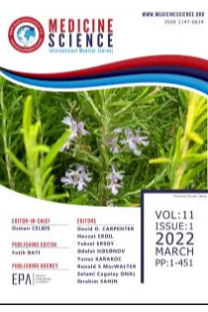Factors associated with seizure recurrence after antiepileptic drug withdrawal
___
1. Su L, Di Q, Yu N, et al. Predictors for relapse after antiepileptic drug withdrawal in seizure-free patients with epilepsy. J Clin Neurosci. 2013;20:790-4.2. Lossius MI, Hessen E, Mowinckel P, et al. Consequences of antiepileptic drug withdrawal: a randomized double-blind study (Akershus Study). Epilepsia. 2008;49:455-63.
3. Kwan P, Brodie MJ. Early identification of refractory epilepsy. N Engl J Med. 2000;342:314-9.
4. Meador KJ. Cognitive and memory effects of the new antiepileptic drugs. Epilepsy Res. 2006;68:63-7.
5. Hessen E, Lossius MI, Reinvang I, et al. Slight improvement in mood and irritability after antiepileptic drug withdrawal: a controlled study in patients on monotherapy. Epilepsy Behav. 2007;10:449-55.
6. Hessen E, Lossius MI, Reinvang I, et al. Influence of major antiepileptic drugs on neuropsychological function: results from a randomized, doubleblind, placebo-controlled withdrawal study of seizure-free epilepsy patients on monotherapy. J Int Neuropsychol Soc. 2007;13:393-400.
7. Medical Research Council Antiepileptic Drug Withdrawal Group. Randomized study of antiepileptic drug withdrawal in patients in remission. Lancet. 1991;337:1175-80.
8. Jacoby A, Johnson A, Chadwick D. Psychosocial Outcomes of Antiepileptic Drug Discontinuation. Epilepsia. 1992;33:1123-31.
9. Specchio LM, Tramacere L, La Neve A, et al. Discontinuing antiepileptic drugs in patients who are seizure free on monotherapy. J Neurol. 2002;72:22-5.
10. Vorderwülbecke BJ, Kirschbaum A, Merkle H, et al. Discontinuing antiepileptic drugs in long-standing idiopathic generalised epilepsy. J Neurol. 2019;266:2554-9.
11. Wang X, He R, Zheng R, et al. Relative seizure relapse risks associated with antiepileptic drug withdrawal after different seizure-free periods in adults with focal epilepsy: a prospective, controlled follow-up study. CNS Drugs. 2019;33:1121-32.
12. Strozzi I, Nolan SJ, Sperling MR, et al. Early versus late antiepileptic drug withdrawal for people with epilepsy in remission. Cochrane Database Syst Rev. 2015;11:001902.
13. Verrotti A, Morresi S, Basciani F, et al. Discontinuation of anticonvulsant therapy in children with partial epilepsy. Neurology. 2000;55:1393-5.
14. Scheffer IE, Berkovic S, Capovilla G, et al. ILAE classification of the epilepsies: Position paper of the ILAE commission for classification and terminology. Epilepsia. 2017;58:512-21.
15. Britton JW. Antiepileptic drug withdrawal: literature review. Mayo Clin Proc. 2002;77:1378-88.
16. Altunbaşak S, Artar O, Burgut R, et al. Relapse risk analysis after drug withdrawal in epileptic children with uncomplicated seizures. Seizure. 1999;8:384-9.
17. Todt H. The late prognosis of epilepsy in childhood: results of a prospective follow-up study. Epilepsia. 1984;25:137-44.
18. Tennison M, Greenwood R, Lewis D, et al. Discontinuing antiepileptic drugs in children with epilepsy. A comparison of a six-week and a nine-month taper period. N Engl J Med. 1994;330:1407-10.
19. He RQ, Zeng QY, Zhu P, et al. Risk of seizure relapse after antiepileptic drug withdrawal in adult patients with focal epilepsy. Epilepsy Behav. 2016;64:233-8.
20. Beghi E, Giussani G, Grosso S, et al. Withdrawal of antiepileptic drugs: guidelines of the Italian league Against epilepsy. Epilepsia. 2013;54:2-12.
21. Specchio LM, Beghi E. Should antiepileptic drugs be withdrawn in seizure-free patients? CNS Drugs. 2004;18:201-12.
22. Emerson R, D'Souza BJ, Vining EP, et al. Stopping medication in children with epilepsy: predictors of outcome. N Engl J Med. 1981;304:1125-9.
23. Peters ACB, Brouwer OF, Geerts AT, et al. Randomized prospective study of early discontinuation of antiepileptic drugs in children with epilepsy. Neurology. 1998;30:724-30.
24. Dooley J, Gordon K, Camfield P, et al. Discontinuation of anticonvulsant therapy in children free of seizures for 1 year: a prospective study. Neurology. 1996;46:969-74.
25. Shinnar S, Berg AT, Moshé SL, et al. Discontinuing antiepileptic drugs in children with epilepsy: a prospective study. Ann Neurol. 1994;35:534-45.
26. Matricardi A, Bertamino F, Risso D. Discontinuation of antiepileptic therapy: a retrospective study of 86 children and adolescents. Ital J Neurol Sci, 1995;16:613-22.
27. Overweg J, Binnie CD, Oosting J, et al. Clinical and EEG prediction of seizure recurrence following antiepileptic drug withdrawal. Epilepsy Res. 1987;1:272- 83.
28. Donati F, Hassink RI, Jung H, et al. Factors predicting the risk of relapse after antiepileptic drug discontinuation in children with partial seizures. Eur J Pediatr. 1995;154:44-7.
29. Ou S, Xia L, Li R, et al. Long-term outcome of seizure-free patients and risk factors of relapse following antiepileptic drug withdrawal. Epilepsy Behav. 2018;88:295-300
- ISSN: 2147-0634
- Yayın Aralığı: 4
- Başlangıç: 2012
- Yayıncı: Effect Publishing Agency ( EPA )
Badel ARSLAN, Nurcan ARAS, Gül YAŞ, Ayşegül ÇETİNKAYA
Superior Mesenteric artery thrombosis as a possible presenting complication of COVID-19
Mohammed Talaat RASHID, Waleed ASKAR, Ahmed GAAFAR, Mohamed FAWZY, Mahmoud Abul MAKAREM
Comperative outcomes of the patients undergoing percutaneous and open trigger finger release
Duran TOPAK, Fatih DOĞAR, Burak KUŞCU, Ali Aydın KARADENİZ, Ökkeş BİLAL
Kevser TURAL, İlknur GÜNAYDIN, Ali Eba DEMİRBAĞ, Ayşen AKSÖYEK, Gizem ÇABUK, Emre KUBAT, Sadi KAPLAN, Kerem VURAL
Attitudes of nursing and medical school students towards ageism
Medine KOÇ, Aygül KISSAL, Rıza ÇITIL, Yalçın ÖNDER
Beneficial effects of ambroxol hydrochloride on pentylenetetrazol-induced convulsion model in rats
Eda SÜNNETÇİ, Halil HATİPOĞLU, Volkan SOLMAZ, Oytun ERBAŞ
Factors associated with seizure recurrence after antiepileptic drug withdrawal
Aslı Ece ÇİLLİLER, Bülent GÜVEN
Celiac disease presenting as dermatitis herpetiformis: A case report
Ali KIRIK, Sinan ÖZÇELİK, Eren ALTUN, Gökyar Figen ASLAN, Gülhan ZORGÖR UÇDU, Teoman DOĞRU
